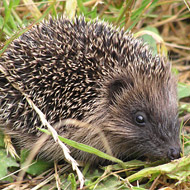
Ecologists to make final appeal at Select Committee hearing
The last-known population of hedgehogs in central London are facing a major threat to their survival, following proposals to use one of their habitats as a lorry park.
HS2 - the proposed high-speed rail link between London and north England - want to use ZSL London Zoo's car park as a lorry stack for heavy goods vehicles. The base would be used for around 20 years, despite the land being a key habitat for the declining species.
In a last-ditch attempt to change HS2's minds, ecologists from ZSl will be appealing to a House of Lords Select Committee meeting next week to request they find an alternative location.
"It may seem strange that we're seeking protection for a car park, but this is an example of the increasingly desperate reality for urban wildlife," said David Field, ZSL's zoological director. "Forced by human pressures to find sanctuary in the unlikeliest of places, it is out duty to protect the remaining refuges of these creatures."
Working with the Royal Parks Foundation and independent hedgehog experts, ZSL has been conducting surveys of Regent's Park. Early findings suggest that the group of hedgehogs living in the car park are actually fairing better than those inside. But further assessments are needed to find out why.
The zoo says that while HS2 have acknowledged their proposal poses a risk to hedgehogs, they are not considering alternative locations.
"They have not accepted our advice that no mitigation measures will be enough to protect them from that risk," adds David.
“With the hedgehog surveys still in their infant stages, we’ve only just begun to learn more about these creatures living in the Park, and we need more surveys, more information and more time to understand how we can best protect them. We can’t do this if the car park becomes a 24/7 hub for construction”.
The Select Committee hearing takes place on the 14 September. Those concerned are asked to join in the fight by tweeting @zsllondonzoo using #teamhedgehog.
Image (C) Tony Walls



 The BSAVA has opened submissions for the BSAVA Clinical Research Abstracts 2026.
The BSAVA has opened submissions for the BSAVA Clinical Research Abstracts 2026.